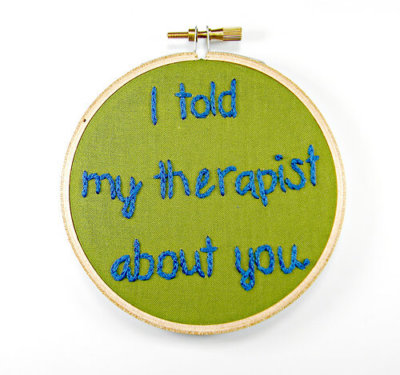Web-Based Therapy – Your Questions Answered

By: Mike Licht
Like most industries, psychotherapy and counselling are transforming with the rise of internet technologies.
And like anything relatively new, there are both myths and truths about how web-based therapy works.
What are the facts you need to know?
What is web-based therapy, really?
Web-based therapy is any sort of counselling or psychotherapy that takes place over the internet instead of in person.
It could be an online course or interactive program to help you deal with stress, anxiety, or ongoing low moods, a format the NHS is now embracing.
Or perhaps you want to try counselling with a therapist via emails or instant messaging. This means you get personal support without having to actually ‘see’ the other person, helpful if you have social anxiety.
But by far the most popular type of web-based therapy is now psychotherapy via video conferencing, also known as ‘online therapy‘, ‘online counselling‘, and even “Skypotherapy’.
How is web-based therapy different than regular therapy?
If you are doing therapy via text or emails, then naturally it’s quite different as you are not actually seeing the therapist. This also means you have far more time to reflect on how you will answer the questions you are asked.
The downside is there is less chance to develop a strong relationship with a therapist, and some research suggests this relationship one of the most beneficial tools of therapy.

By: Hey Paul Studios
Web- based therapy over Skype or Facetime, however, is actually the same as normal therapy, with a few small tweaks.
You still commit to meet your therapist for the agreed time every week, and each appointment is still going to be around 50-minutes.
The difference of course is you are not in the same room as your therapist.
While some people love the rapport of real-time therapy, others love the flexibility of web-based therapy which means you can have your counselling sessions from anywhere in the world.
Are web-based therapists and counsellors different to regular ones?
No, they still take the same training as any other psychotherapist or counsellor. It’s just that they have decided to also work over the internet, or even exclusively over the internet now that web-based therapy is becoming so popular.
It is true, however, that many ‘new’ therapists seem to start working on the internet first these days. So it is advisable to choose a web-based therapy service that offers counsellors and psychotherapists with real experience working with your issues.
Do web-based therapists have any additional training?
At present there is no certified training to help therapists come across well over the internet, and it’s just something they have to figure out themselves. But some umbrella psychotherapy companies might offer their therapists private training to make sure you receive the best experience possible.
Is web-based therapy priced differently?
This is at the discretion of the practitioner or the company they work for, but for the most part web-based therapy is priced the same as in-person therapy.
Even so, it can be seen as a more economical option because you save on the time and cost of travelling to and fro to your therapist’s office, and might be able to save on things like babysitting.
Why would I choose web-based therapy over regular therapy?
It’s a personal choice, and often it’s one that is down to lifestyle. If you travel a lot, then web-based therapy is a great option which means you can find time to attend therapy no matter where you are.
Web-based therapy is also great for those who are location bound, for example, the injured, a caretaker who has troubles finding time away, or a mother of many small children.
Some people also choose web-based therapy as it just feels a better fit for them, such as those who suffer social anxiety or extreme depression, both of which make going out into the world a challenge.
How do I know if web-based therapy is for me?
Again, it depends on your personality, your schedule, and your personal choice. It’s certainly not right for everyone.
We recommend you read our related piece, “Online counselling – How Can You Know It’s Right For You?”.
What’s the most important thing I need to know about web-based therapy?
There are actually two very important things to know.
First, don’t see web-based therapy as an either or decision. Many therapists nowadays are happy to offer a blend of in-person and online therapy. So when you are in town you can attend sessions, and when you are travelling you can use the internet.
The second important thing to keep in mind is that web-based therapy, like any therapy, is a relationship between you and your therapist.
It might take time to find the right fit where you feel you can trust your therapist. Don’t give up or think therapy doesn’t work, just because after a few sessions you are not feeling comfortable and need to try another therapist.
But does web-based therapy actually work?
Absolutely. In fact web-based programs integrating CBT, actually called CCBT (computerised cognitive behavioural therapy) are now recommended as an intervention by the very stringent body that governs medical recommendations in the UK, the National Institute of Health and Care Excellence (NICE).
And studies have found that in some cases, such as those involving phobias and anxiety, web-based therapy can be more affective than in-person therapy.
Of course, like any sort of talk therapy, it works only as well as you are willing to commit to it and put in the effort.
Is web-based therapy the way of the future?
It might just be. Again, it has been proven to be just as effective as regular therapy, and for some mental health conditions it was even found to produce better results.
That said, there is something very powerful about experiencing the client therapist relationship in person, so it’s doubtful that in-person talk therapy will ever not exist.
Would you like to try a session of online therapy? Harley Therapy offers sessions over Zoom, Skype, etc. no matter where you are in the world, with therapists that all have minimum of ten years clinical experience dealing with issues just like yours. Go to our Online counselling page to learn more.





